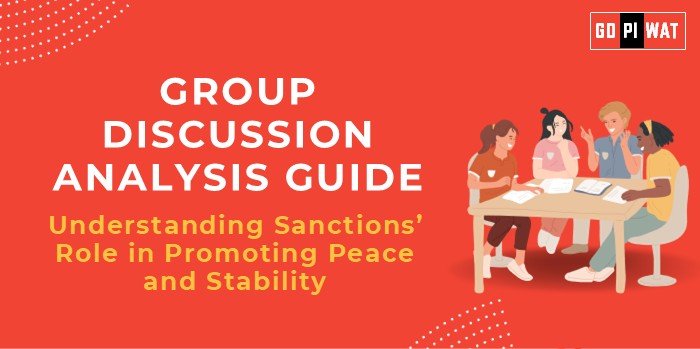📋 Group Discussion (GD) Analysis Guide
🌍 Topic: Can International Sanctions Effectively Promote Peace and Stability?
📖 Introduction to the Topic
- 💡 Opening Context: International sanctions have been a pivotal tool in the global diplomatic toolkit, often deployed to pressure regimes, curtail conflicts, or prevent human rights abuses. However, their effectiveness in fostering peace and stability is a topic of contentious debate, impacting geopolitical alliances and economic landscapes worldwide.
- 📜 Topic Background: Sanctions have evolved over decades, from comprehensive trade embargoes to targeted measures against individuals, corporations, and specific sectors. Historically used during the Cold War, their application has expanded, focusing on nuclear non-proliferation (e.g., Iran, North Korea) and conflict resolution (e.g., Russia-Ukraine). While they aim to compel behavioral change without direct military intervention, the outcomes often vary significantly.
📊 Quick Facts and Key Statistics
- 🌍 Global Use: Over 200 active sanctions programs worldwide (UN & US Treasury, 2023).
- 📉 Economic Impact: The 2022 sanctions on Russia cut its GDP by an estimated 2.1% (World Bank).
- 🛢️ Iran Example: Sanctions reduced oil exports by 80% from 2012-2015.
- ⚕️ Humanitarian Costs: 60% of sanctioned countries report significant healthcare disruptions (WHO, 2023).
- ✔️ Success Rate: Only 34% of sanctions achieve their intended political outcomes (Peterson Institute for International Economics).
🌍 Stakeholders and Their Roles
- 🏛️ United Nations: Formulates multilateral sanctions under international law.
- 🌍 Individual Nations: Enforce unilateral measures (e.g., US and EU sanctions on Russia).
- 💻 Private Corporations: Compliance with restrictions (e.g., tech companies halting operations).
- 👥 Impacted Populations: Face economic hardships and social disruptions.
- 🤝 Non-Governmental Organizations: Advocate for minimizing humanitarian fallout.
🏆 Achievements and Challenges
✨ Achievements
- 🤝 Behavioral Change: Libya dismantled its WMD program in 2003 under sanctions pressure.
- 🌍 Conflict Management: Sanctions on apartheid-era South Africa facilitated political reforms.
- 🔒 Nuclear Non-Proliferation: Reduced Iranian nuclear capabilities under JCPOA-related sanctions.
⚠️ Challenges
- 🚨 Unintended Consequences: Humanitarian crises in North Korea and Venezuela due to sanctions-induced shortages.
- ⚡ Circumvention: Black markets and alternative alliances, like Russia-China energy trade.
- ❌ Limited Effectiveness: Prolonged sanctions often fail to bring about regime change (e.g., Cuba, decades-long embargo).
🌏 Global Comparisons
- ✔️ Effective Example: UN sanctions on Sierra Leone contributed to ending civil war (1997-2002).
- ❌ Ineffective Example: Sanctions on Myanmar failed to halt military oppression.
📚 Case Studies
- 🇮🇷 Iran: Sanctions led to economic downturn but fostered nationalism and resistance.
- 🇷🇺 Russia-Ukraine Conflict: Sanctions weakened Russia’s economy but also strained European energy markets.
💡 Structured Arguments for Discussion
- ✔️ Supporting Stance: “Sanctions are an effective alternative to war, leveraging economic power to foster compliance, as seen in Libya’s denuclearization.”
- ❌ Opposing Stance: “Sanctions disproportionately harm civilians, creating long-term resentment without achieving political goals, evident in Venezuela.”
- ⚖️ Balanced Perspective: “While sanctions can isolate rogue states, their success hinges on international coordination and mitigating humanitarian costs.”
📈 Effective Discussion Approaches
- 🗣️ Opening Approaches:
- 💬 “The efficacy of sanctions depends on their design—targeted sanctions often yield better outcomes than blanket trade bans.”
- 🌍 “How do sanctions balance international law with economic and humanitarian consequences?”
- 🔄 Counter-Argument Handling: Example: “While sanctions harmed Iran’s economy, they opened diplomatic channels like the 2015 nuclear agreement.”
🔍 Strategic Analysis of Strengths and Weaknesses
- 💪 Strengths: Non-violent, international consensus, adaptable.
- ⚠️ Weaknesses: Humanitarian impact, enforcement challenges.
- 🚀 Opportunities: Leveraging tech to improve precision.
- ⚡ Threats: Retaliatory alliances, global market disruptions.
🎓 Connecting with B-School Applications
📚 Real-World Applications
Policy formulation, risk management in global trade.
📋 Sample Questions
- 💬 “How can sanctions be made more humane and targeted?”
- 💬 “Discuss a sanctions program’s economic implications on global markets.”
💡 Insights for Students
- 🌍 Explore case studies to analyze ethical implications and economic impacts.
- 📖 Leverage sanctions data for policy-related internships and global trade projects.


